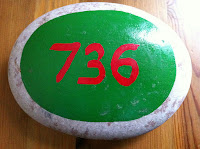This is one of a series of articles on lessons from Commando training. Here is the full list.

The Royal Marines specialise in creating high performing teams, and yet they don't pay exceptional salaries or offer annual bonuses. Much of their performance is driven by powerful symbolism and the sense of belonging and commitment that this creates. Most organisations can benefit from a similar approach, boosting team performance without draining the corporate coffers. The secret lies in engaging team members with the corporate vision - and often embodying that vision in simple symbols. I saved my employer many thousands of pounds when I learned this lesson.
Do you have a talisman that is always with you? Something which inspires and motivates you, like a piece of religious jewelry, a wedding ring or a photograph of your family? Something that identifies you with a group of people who share your beliefs, your support for a sports team, your DNA or something else? If you do, the chances are you will quickly identify yourself with that group if you are asked to describe yourself - it forms an important part of your identity.
Tenderfoot
Four weeks into my training as a Royal Marine we were sent on our first field exercise - Exercise Tenderfoot. This was a week-long camping trip designed to familiarise us with techniques like camouflage and concealment, navigation and communications. Every day began at 0600 with a full inspection every item of our equipment to ensure that we had cleaned, folded and waterproofed everything and shaved every single bristle. Those whose toothpaste tubes were not evenly squeezed, or whose socks were not folded the same way as everyone else could look forward to half an hour of "thrashing" - grueling physical exercise designed to reinforce the lesson that a good Royal Marine always takes care of his equipment and pays attention to detail.
Stoned?
One morning this routine varied slightly. We were led to a bleak part of Woodbury Common and among the gorse 2 Section (about a third of us) were called forward. Sergeant MacDonald, their section Sergeant, instructed them to strip to the waist and kneel down along a path. The rest of us watched as the sun rose on this scene and we wondered if we were about to witness a new order of magnitude of punishment for some misdemeanour we didn't know about. After a few moments, Sergeant MacDonald made a short speech. It seemed pretty surreal at the time - he informed them that they were about to take on an onerous responsibility, and that each of them would be required to look after a small stone. He then presented each kneeling section member with a pebble painted with the first three letters of their surnames. He explained that they were to carry this stone with them at all times (the only exceptions being when they were swimming or showering). Finally, and to no-one's surprise, he pointed out that the penalties for failing to produce the stone on demand would be severe.
We left the scene of this strange ceremony and returned to our training. Over the coming weeks and months, 2 Section's stones became a feature of their identity. At first the rest of us (in 1 and 3 Sections) felt we had escaped lightly as we watched hapless members of 2 Section running up and down various hills after failing to produce stones when challenged. But we also noticed that 2 Section welcomed their occasional hardships as a price worth paying for being a bit "special". On the command "With your stones, prove!" they would proudly scrabble in pockets or dig out specially created necklaces and present their stones for inspection. They quickly produced a much larger stone with "Sergeant of the week" painted on it which they presented each week to one of the training Sergeants.
From ceremony to increased retention
I noticed the effect that the stones had on 2 Section, and when a couple of years later I was training recruits, I copied Sergeant MacDonald's idea. In a cliff-top sunset ceremony I presented each of the recruits in my troop with a stone with their initials painted on it and explained that their membership of 736 Troop came with an extra duty. Like 2 Section, they were mystified at first, but quickly realised that their stones marked them out from the other recruit troops in training. Each week one person would be singled out to carry the Troop stone, a larger and heavier stone (pictured left) that added a couple of kilos to already heavy loads. The troop became fiercely possessive of these peculiar symbols and built a lore around it which intrigued other recruit troops and their training teams.
How this can save you money
But the real value of the stones was much more dramatic than bragging rights. 736 Troop had the highest retention rate since detailed records had begun 5 years earlier. In other words, fewer recruits failed the key tests that enabled them to progress to the next stage of training, and fewer opted to leave the Royal Marines, so the return on investment in the training of the troop was exceptionally high. On the few occasions when I had to "backtroop" a recruit, handing back his stone was the most poignant part of his departure from 736 Troop. Recruits worked extra hard to stay in the troop that gave them the right to carry a stone. A half hour ceremony on a cliff-top saved the taxpayer a small fortune. And when they passed out of training, my troop presented me with an enormous boulder bearing all their signatures.
If you are in charge of a team perhaps you have found ways to boost team performance that don't involve simply raising salaries. If you have, please share them here.
This is one of a series of articles on lessons from Commando training. Here is the full list.



